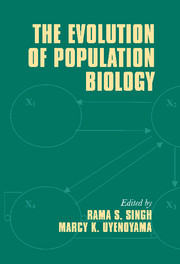Book contents
- Frontmatter
- Contents
- List of contributors
- Publications of R. C. Lewontin
- Preface
- Introduction
- Part I Historical foundations and perspectives
- Part II Genotypes to phenotypes: new genetic and bioinformatic advances
- Part III Phenotypes to fitness: genetics and ecology of populations
- Part IV Genes, organisms, and environment: evolutionary case studies
- Part V Applied population biology: biodiversity and food, disease, and health
- Index
Preface
Published online by Cambridge University Press: 08 January 2010
- Frontmatter
- Contents
- List of contributors
- Publications of R. C. Lewontin
- Preface
- Introduction
- Part I Historical foundations and perspectives
- Part II Genotypes to phenotypes: new genetic and bioinformatic advances
- Part III Phenotypes to fitness: genetics and ecology of populations
- Part IV Genes, organisms, and environment: evolutionary case studies
- Part V Applied population biology: biodiversity and food, disease, and health
- Index
Summary
Scientists earn their reputation by making special contributions in a variety of ways. Some become known for a discovery that revolutionizes their science. Others are respected as intellectual leaders for significant contributions leading to sustained progress in their field. Still others become known for providing guidance, opportunity, and uniquely inspiring rapport with a large number of graduate students, writers, and research colleagues. A rare few do all the above, and remarkably enough still find time to deal with the broader issues of epistemology, philosophy, history, and sociology of science. Richard Lewontin is one of these rare scientists.
If we are to attach a major discovery or a conceptual breakthrough to Lewontin's name (like Haldane's cost of natural selection, Fisher's fundamental theorem of natural selection, Wright's shifting-balance theory, or Maynard Smith's game theory applications), then the successful completion of the genetic variation research program of the Chetverikov–Dobzhansky school will be known as the outstanding highlight of Lewontin's career. Dobzhansky and his students and collaborators pursued the twin problems of the amount and the adaptive role of genetic variation for nearly 25 years without a satisfactory solution. All estimates of genetic variation were indirect or inadequate as there was no reductionist research program that could allow the study of genetic variation at the level of the gene. Lewontin's pioneering success in the application of protein electrophoresis to the problem of genetic variation changed the scene radically. The estimation of electrophoretic variation was direct and more useful than anyone had expected.
- Type
- Chapter
- Information
- The Evolution of Population Biology , pp. xxvii - xxxPublisher: Cambridge University PressPrint publication year: 2004



